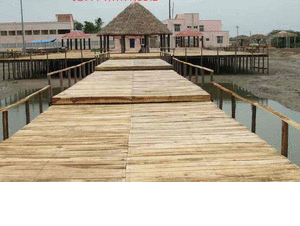
Article Of Parangi Pettai.
Parangi Pettai! historically called Porto Novo also called Mohmood Bander,is a panchayat town
in Cuddalore district state of Tamil Nadu. Parangipettai is situated on the north bank of the mouth of the
Vellar river at a distance of 30 km from Cuddalore. From Chennai 205KM distances, Parangipettai can be
reached through the National Highway NH45A stretch between Cuddalore and Chidambaram.
It has an interesting historical background.
Today, Parangipettai has a thriving trade with nations in the Middle East and South East Asia.
It also hosts a Marine Biology Station affiliated with the Annamalai University.
Parangipettai is an important pilgrimage centre for both Hindus and Muslims.
It is ironic that Parangipettai still remains as a town in Tamil Nadu, as it has seen the arrival
of wealth and different people even before the dawn of globalisation.
History
Throughout its history, Parangipettai has had other names. One was 'Portonovo' from when
the Portuguese sailors observed the small port there from their ships. Other names were
'Muthukrishna puri' when nayakkar ruled, 'Mohammed Banthar' and 'Varuna puri'.
Pettai means market place and Parangipettai means the pettah or abode of the parangis or
Europeans in Tamil. The town was called "Mahmood Banthar" during the Mughal
Empire period, and later Porto Novo by the Portuguese, who controlled the region from
the early 16th century to the early 18th century. The French named this place "Portonovo"
when they temporarily occupied it before moving on to establish their colony in Pondicherry.
Muslims living in Parangipettai have a unique Arab ancestry.
Second Anglo-Mysore War
The Second Anglo-Mysore War was fought here between Hyder Ali and the British
under Sir Eyre Coote in July 1781. The town flourished as a sea port with connections
to southeast Asia and as an industrial centre during British rule, when Iron made here
was exported to England. The powerful Nawab of Arcot had his mint at Porto Novo
and the gold coins struck in this mint came to be called the Porto Novo Pagoda. Later
the English followed the same design when they minted the 'Negapatam' (Nagapatnam)
Pagoda and the Dutch minted their coin in the same design at Tuticorin and Colombo mints.
In Ceylon (Srilanka), in the Sinhalese language, it was known as ParangiPatta.
There is a Gandhian connection also. A European disciple of Mahatma Gandhi established
a school, the "Seva Mandir Scahool", based on Gandhian principles.
Two rivers join the sea here are the Vellaru, a branch of the Kaveri River, and the
Buckingham Canal.



